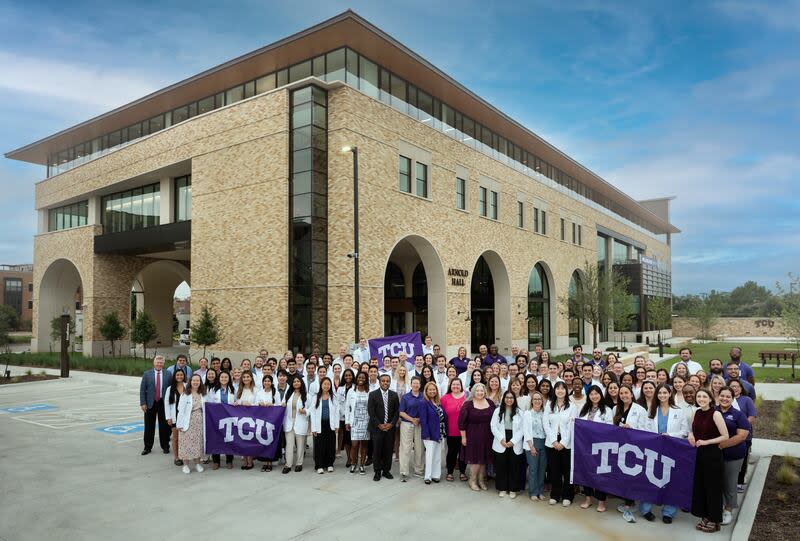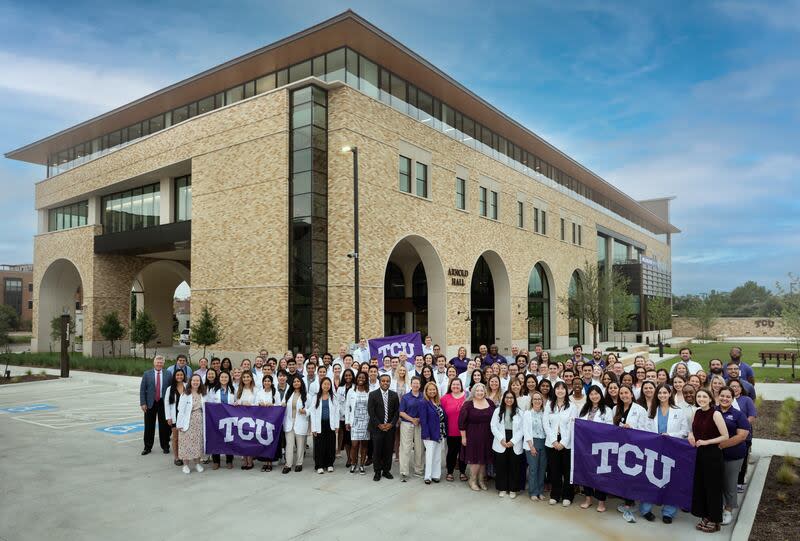Dr. Stuart Flynn likely knows more about taking a medical school from concept to full accreditation than anyone in the country.
He’s done it twice in recent years, once at state-supported University of Arizona-Phoenix, and more recently at the private, church-based Texas Christian University in Fort Worth, Texas.
“It’s just an amount of detail that you just don’t anticipate, even when you look at the accreditation standards,” said Flynn in a recent interview.
“I can only imagine what it must have been like back in the Gemini and Apollo days trying to go to the moon. It starts out big picture, but boy, eventually you end up really getting down to the nitty gritty of things like curriculum, faculty, mentoring and assessment, and every one of those things opens up a whole new world,” said Flynn, founding dean of TCU’s Anne Burnett Marion School of Medicine.
Following the recent announcement by The Church of Jesus Christ of Latter-day Saints that it plans to create a medical school at Brigham Young University, there has been intense interest when the school will accept its first cohort, how long it will take for it to reach full accreditation and how it will differentiate itself from other medical schools nationally.
The announcement says more details will be announced in the future but it says the medical school’s focus will be “international health issues affecting members of The Church of Jesus Christ of Latter-day Saints” and its “worldwide humanitarian efforts.”
The BYU medical school will be focused on teaching with research in areas of strategic importance to the church. “In time the school will draw students from within and outside the United States. The BYU medical school will not create its own hospital or hospital system,” according to the announcement.
The road to accreditation
The journey from concept to full accreditation will be a “multi-step process,” said Dr. Marc Kahn, dean of the Kerkorian School of Medicine at the University of Nevada, Las Vegas.
“Roughly, from the time that you say you’re going to start a medical school until you recruit your first class, you’re practically talking about at least three years,” said Kahn.
Flynn, who was also the founding dean of the University of Arizona College of Medicine-Phoenix, said until a planned medical school achieves preliminary accreditation from the Liaison Committee on Medical Education, “you cannot even talk about your medical school. … You do not exist.”
Once the school is notified of preliminary accreditation, “now you’re accredited, and now you can start to talk about your medical school, start to advertise to recruit students.”
According to a timeline on TCU’s Burnett School of Medicine’s website, the school was awarded preliminary accreditation from the LCME in October 2018, which enabled it to begin recruiting its inaugural class.
The medical school submitted its provisional accreditation materials in November 2020, leading to provisional accreditation from the LCME in June 2021. The school submitted materials for full accreditation in November 2022 and a survey visit occurred in February 2023, and full accreditation was granted in June 2023.
TCU’s cohort size is 60 students, which Flynn said was determined by the university administration, backing the medical school administrators’ recommendation. “Our curriculum could only be accommodated by no more than 60 students a year so it was purely an educational paradigm,” he said.
According to the medical school’s website, the Burnett School of Medicine focuses on “developing ‘empathetic scholars,’ while embracing and leading major drivers in the future of medicine, including artificial intelligence, technology monitoring patient health and disease and genomics. Each student also does a four-year research thesis, nurturing lifelong inquiry and learning.”
At UNLV, its medical school cohort is 66 students, after starting with 60. It’s mission, according to its website, is to “serve our patients, students, medical professionals, and community as a transformational force for improving healthcare in Nevada.”
“We’d like to get up to 90, but to have an increase of more than 10% requires approval from the LCME, the accrediting body. They’re scheduled to come next year in 2025 so when we have our site visit, we’re also going to ask for an expansion of class size,” Kahn said.
Both medical schools built new, state-of-the-art medical education buildings, but neither has constructed a teaching hospital. UNLV students train at the nearby University Medical Center, a nonprofit government hospital owned and operated by Clark County.
TCU’s medical students train at various hospitals in the Fort Worth area and North Texas, including Cook Children’s Medical Center.
While both medical schools are relatively new — the Kerkorian School’s charter class graduated in May 2021 — interest was high among prospective students and faculty at both institutions from the start.
“We were fortunate when we started out that there was no other allopathic medical school in Las Vegas,” said Kahn.
“Secondly, we’re a state school, so our tuition is less than private schools. Thirdly, the founding dean raised money so that the first, almost two classes, went to medical school for free,” he said.
When Flynn was hired to start Burnett Medical School at TCU, most of his administrative team from the University of Arizona College of Medicine came with him so they were well-acquainted with the accreditation process and they were a known entity.
Also, the competition for slots in accredited allopathic medical schools is so intense that students who want to train as medical doctors welcome additional options for possible admission.
TCU admitted its first class in 2019 after it was approved for preliminary accreditation in October 2018, “which meant we had six weeks to recruit our first class, because it’s all regulated nationally on an admission cycle. So we had six weeks. If we had waited until the February date, we would have lost the whole year. But that’s how fast all of that happened,” Flynn said.
Why BYU’s reputation will be an advantage
Kahn and Flynn both said they anticipate that BYU’s planned medical school will be viewed favorably by prospective students and medical educators.
“BYU has the advantage that it’s a well known institution, so I don’t imagine BYU will have much trouble attracting faculty. If you’re a small private school, that becomes much more challenging depending on your location, but I imagine a school with a reputation of BYU is really not going to have a problem,” Kahn said.
Kahn said BYU will also have an advantage “that we did, too, and that is that there were people very surprised that we were a new medical school.
“When I told people at Tulane that I was leaving to become the dean of a newer medical school at UNLV, they said, ‘Wait, UNLV hasn’t always had a medical school?’ I said, ‘No, I haven’t graduated a single student yet,’ ‘’ said Kahn, former senior associate dean at Tulane University School of Medicine before joining UNLV in April 2020.
“So that surprises people, and I think there’s going to be people who just assumed BYU has a medical school, so when it actually graduates its first class and people apply in The Match, a lot of people aren’t going to realize that this is a new medical school and this is a first graduating class, and that’s an advantage for schools like BYU and us, actually,” said Kahn.
The Match is a process that helps medical school graduates and residency programs find each other for first- and second-year post-graduate training positions. The process is managed by The National Resident Matching Program.
The results of Match Day indicate how a medical school and its students are perceived nationally as they vie for a limited number residency programs.
Flynn said BYU is “a big name, high caliber university and a state icon. If they want to start a medical school, then I would say they’ve got the gravitas and the gumption to do it well, so hat’s off.”
Medical schools already in Utah
There are three medical schools in Utah. The University of Utah’s Spencer Fox Eccles School of Medicine was established in 1905. It is a public institution with a connected hospital and it is the only allopathic medical school in the state. Its current cohort is 125 students.
There are two private colleges of osteopathic medicine in the state: Noorda College of Osteopathic Medicine in Provo and a branch of Rocky Vista University College of Osteopathic Medicine in Ivins, Washington County.
Another private school, Roseman University, has a campus in South Jordan. Its Nevada campus is currently trying to get accreditation for a medical doctor program.
Flynn said there are a growing number of private entities starting schools of osteopathy elsewhere in the country.
Perhaps this phenomena was part of a “strategy of reflection” on BYU’s part “because they are starting to get surrounded by all these other entities. They’re big enough they can grow their own entity, and then the others have to respond to them instead of the other way around.”
Flynn said the changing dynamics in medical education also impact the availability of clinical training sites.
“The more you have, the fewer clinical training sites any school has to train its students. So what do you do? Some of the DO (Doctor of Osteopathy) schools, some of the offshore schools, start buying training time, and the kids pay for it. The medical school doesn’t pay for it. So for $1,000 a month, you can go and work with this surgeon or $2,000 a month.
“Well, the good news at every place I’ve been, you know, for as grumpy as we get about things, my students pay tuition, but I have their training sites. They don’t have to go out and try to barter and purchase them,” he said.
Flynn said BYU’s experience with accreditation, as with all nascent medical schools, will be intense and time consuming.
“It seems like every day that you’re working on it costs you three days,” he said. Deadlines grow “closer and closer, and you keep learning all these nuances that the LCME is going to hold you accountable for, right?
“The first, the preliminary is, are you ready to matriculate a class? That’s the mirror they hold up, and you better be ready from a physical plant, from a financial plan, from a faculty, plant from a curricular, plant from all of those things,” he said.
Flynn likens the experience to being put through a meat grinder “and I think that’s good. I should be put through it. BYU should be put through the meat grinder,” Flynn said.
According to the Liaison Committee on Medical Education, LCME accreditation “signifies that national standards for structure, function, and performance are met by a medical school’s educational program leading to the MD degree.”
For medical school founders, taking a medical school from announcement to full accreditation is a once-in-a-lifetime opportunity to create a professional school that can profoundly alter the trajectory of students’ practice and patients’ lives.
Kahn said BYU’s foray into medical education appears promising.
“With the resources of BYU, I have no doubt that they’re going to be successful,” he said.
Said Flynn, “It’s their opportunity to build a medical school that the state will just be so, so proud of,” he said.

EMEA Tribune is not involved in this news article, it is taken from our partners and or from the News Agencies. Copyright and Credit go to the News Agencies, email news@emeatribune.com Follow our WhatsApp verified Channel





